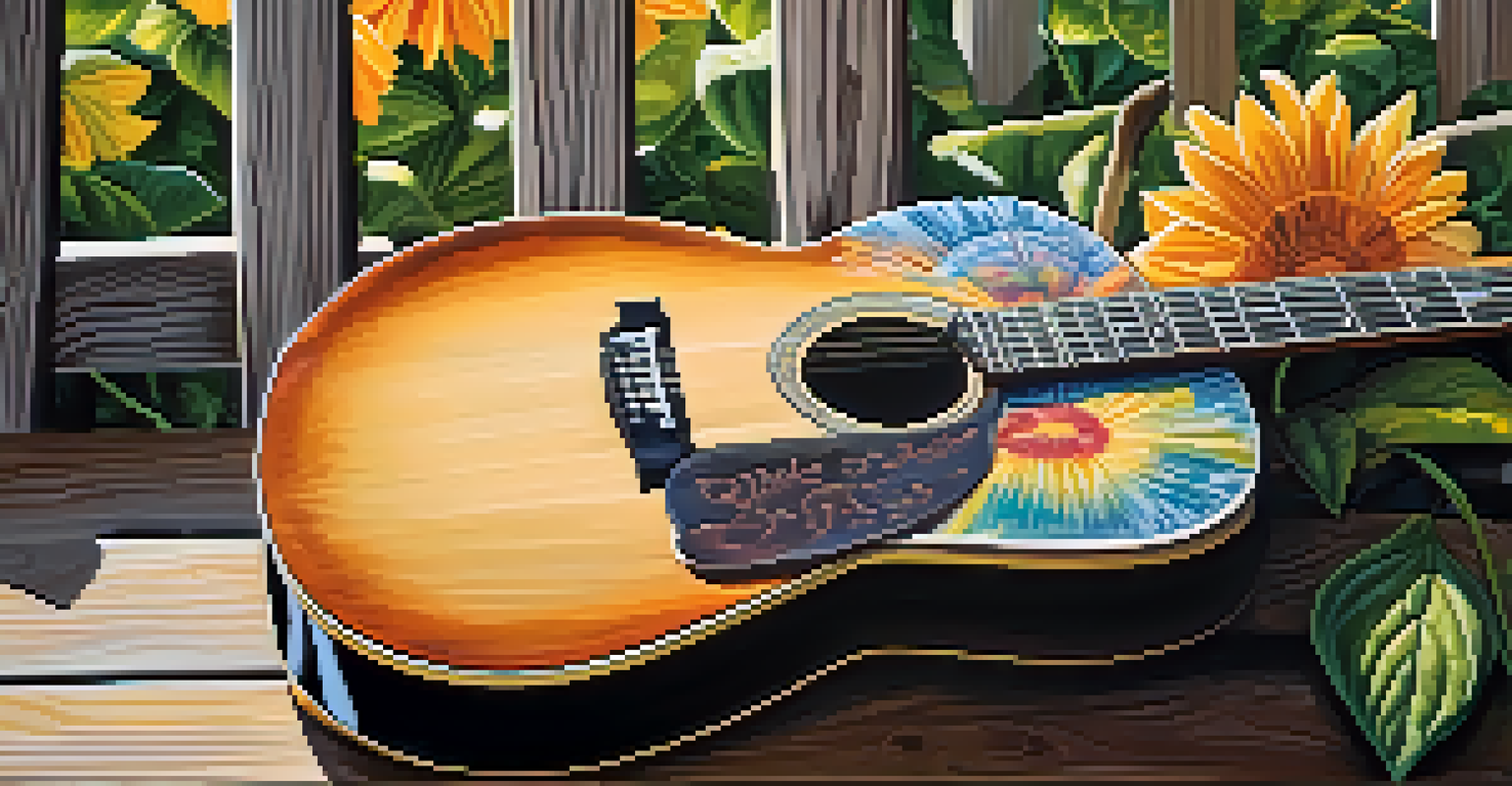Analyzing the Lyrics of Protest Songs: A Political Lens

Understanding Protest Songs and Their Impact
Protest songs have been a powerful tool for social and political change throughout history. They resonate deeply with audiences, often reflecting collective frustrations or hopes. From 'Blowin' in the Wind' to 'Fight the Power,' these songs create a sense of unity and purpose among listeners. Understanding their impact involves recognizing how they articulate the struggles of marginalized voices and inspire movements.
The music we listen to can change the world. It can bring us together and ignite the fire of change within us.
Historically, protest songs have emerged during times of turmoil, serving as anthems for change. For example, during the Civil Rights Movement, songs like 'We Shall Overcome' became rallying cries, encapsulating the spirit of resilience and hope. The emotional weight of these lyrics often transcends mere words, igniting passion and action within communities. This connection illustrates how music can be a catalyst for societal transformation.
In analyzing protest songs, it's essential to consider their cultural and political context. Lyrics often reflect the zeitgeist of a particular era, encapsulating the sentiments of the people. By examining when and why these songs were created, we can uncover the layers of meaning that resonate with listeners, making the songs not just entertainment, but critical commentary on social issues.
Key Themes in Protest Song Lyrics
Protest songs often tackle universal themes such as injustice, inequality, and resistance. These themes resonate across generations, allowing new audiences to connect with the struggles of the past. For instance, the theme of fighting against oppression is prevalent in many songs, from Bob Dylan's critiques of war to contemporary artists addressing systemic racism. These common threads help unify diverse movements under a shared narrative.

Another significant theme in protest songs is empowerment, encouraging listeners to take action. Lyrics often inspire individuals to rise against the status quo, emphasizing the power of collective action. For example, the rallying chorus of 'We Will Not Be Moved' serves as a reminder that resilience can lead to meaningful change. This focus on empowerment fosters a sense of agency among listeners, motivating them to engage in activism.
Protest Songs Inspire Social Change
Throughout history, protest songs have united people by articulating collective frustrations and hopes, serving as catalysts for social movements.
Additionally, protest songs often employ vivid imagery and storytelling to convey their messages. Through metaphors and personal anecdotes, artists paint a picture of the issues at hand, making them relatable and urgent. This storytelling aspect not only engages listeners but also deepens their understanding of complex social issues, transforming abstract concepts into tangible realities.
The Role of Music in Political Movements
Music has long played a crucial role in political movements, serving as both a form of expression and a rallying point. From the folk songs of the '60s to today's hip-hop anthems, protest music has provided a soundtrack to social justice efforts. This connection between music and activism highlights how melodies can amplify messages, making them more memorable and impactful.
Music is the weapon of the future.
Moreover, protest songs often create a sense of community among activists. Singing together fosters camaraderie and solidarity, reinforcing the idea that individuals are part of a larger movement. Events like marches or rallies often feature live performances, reinforcing the emotional connection between music and collective action. This shared experience not only strengthens bonds but also elevates the songs' messages within the movement.
In today's digital age, the reach of protest music has expanded significantly. Social media platforms allow songs to spread quickly, rallying support across geographical boundaries. This accessibility means that artists can influence movements globally, uniting diverse voices under a common cause. The power of music to transcend borders plays a pivotal role in shaping contemporary activism.
Analyzing the Lyrics: A Deeper Dive
To truly understand protest songs, we must delve into their lyrics and uncover the layers of meaning. Focusing on specific phrases or verses can reveal the artist's intent and the emotions they aim to evoke. For instance, examining the line 'I can't breathe' from the song inspired by the Black Lives Matter movement illustrates the urgency and pain behind the message. Analyzing such lyrics connects listeners to the real-life experiences that inspired them.
Language choice is also crucial in understanding protest song lyrics. The use of slang, colloquialisms, or poetic devices can enhance the emotional resonance of a song. For instance, the repetition of certain phrases often serves to emphasize key points, making the message more memorable. This linguistic analysis allows us to appreciate the artistry involved in crafting lyrics that resonate deeply with listeners.
Empowerment Through Music
The themes of empowerment and resistance in protest songs motivate listeners to take action against injustice and inequality.
Furthermore, context plays a vital role in interpreting lyrics. Knowing the social or political events surrounding the song's release can provide insight into its meaning. For example, understanding the historical backdrop of a protest song can illuminate why certain themes were highlighted. This context not only enriches our understanding of the lyrics but also connects them to broader social movements.
Iconic Protest Songs and Their Legacy
Certain protest songs have achieved iconic status, leaving a lasting legacy in both music and social justice. Songs like 'A Change is Gonna Come' by Sam Cooke are not only celebrated for their musicality but also for the powerful messages they convey. These anthems often become synonymous with the movements they represent, serving as reminders of struggles faced and victories won. Their continued relevance speaks to the ongoing nature of the issues they address.
Moreover, the legacy of protest songs extends beyond their initial impact. Many contemporary artists draw inspiration from these iconic tracks, creating new works that echo their predecessors. For example, modern artists often sample or cover classic protest songs, infusing them with fresh perspectives for new audiences. This evolution keeps the spirit of protest alive, ensuring that the messages remain pertinent in today's social landscape.
The influence of iconic protest songs can also be seen in the way they inspire new generations of activists. Many young people discover these songs through cultural references or social media, reigniting interest in the themes they address. This intergenerational connection fosters a sense of continuity in the fight for justice, reminding us that music has always served as a powerful vehicle for change.
Modern Protest Songs: Voices of Today
In today’s music scene, modern protest songs continue to emerge, reflecting contemporary issues and movements. Artists like Kendrick Lamar and Hozier tackle themes such as racism, climate change, and inequality through their lyrics. These songs resonate with audiences who seek to understand and engage with the pressing challenges of our time. The relevance of these modern anthems underscores the enduring power of music as a form of protest.
The accessibility of music through streaming platforms has also democratized the creation and consumption of protest songs. Independent artists can share their messages widely without the constraints of traditional media. This shift allows for diverse voices to emerge, bringing attention to issues that may have been overlooked in mainstream music. As a result, the landscape of protest music is richer and more varied than ever before.
Modern Voices Shape Activism
Today’s protest songs reflect contemporary issues and leverage social media to amplify their messages, connecting diverse audiences in real-time.
Additionally, social media plays a significant role in promoting modern protest songs. Hashtags and viral trends can propel a song into the spotlight, connecting it with movements in real-time. This immediate connection between music and activism enhances the impact of both, creating a dialogue that encourages awareness and action. The synergy between modern protest songs and social media amplifies their messages, inspiring listeners to take part in the fight for change.
The Future of Protest Songs in Activism
As we look to the future, the role of protest songs in activism remains crucial. With ongoing social and political challenges, music will continue to serve as a powerful tool for expression and unity. The ability of artists to articulate the struggles of their communities ensures that protest songs will adapt and evolve alongside societal changes. This adaptability highlights the resilience of music in the face of adversity.
Moreover, the fusion of different musical genres can lead to innovative protest songs that resonate with broader audiences. Artists from various backgrounds are collaborating to create new sounds that reflect diverse experiences. This blending of styles not only enriches the protest music landscape but also fosters inclusivity, drawing in listeners who may not have engaged otherwise. The future of protest songs lies in this creative evolution.

Finally, as technology advances, the ways in which protest songs are shared and experienced will continue to transform. Virtual concerts, interactive platforms, and global connectivity will shape how these songs are disseminated and received. These developments promise to enhance the impact of protest music, ensuring that its messages reach those who need to hear them most. Ultimately, the future of protest songs is bright, driven by the power of music to inspire change.